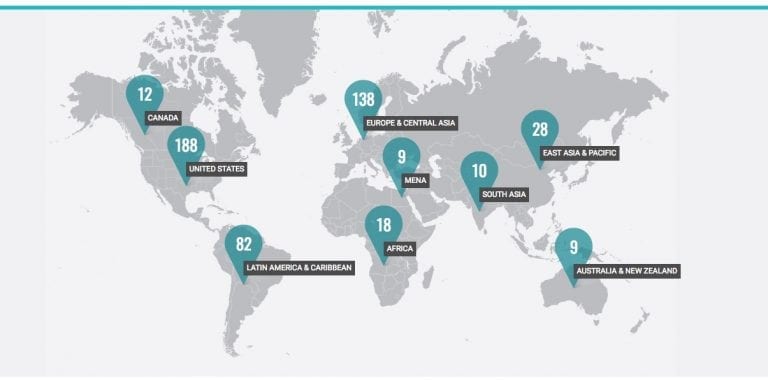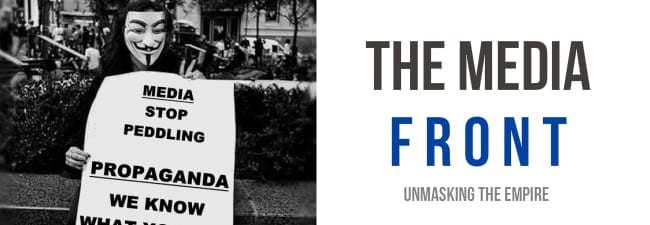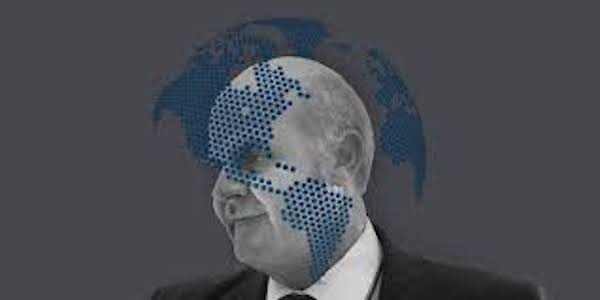The Atlas Network’s insidious impact on the ground

Originally published: Peoples Dispatch by Aram Aharonian and Álvaro Verzi Rangel(August 29, 2018)
Aram Aharonian and Álvaro Verzi Rangel, co-directors of the Observatory in Communication and Democracy (OCD) and Latin-American Centre of Strategic Analysis (CLAE), wrote a detailed analysis of the Atlas Network and its deep impact in Latin America. We are sharing a translated version of this article in 2 parts, the first part is about the network itself and the second part addresses specific country cases. Please read them below.
Part 1: Atlas Network, the right-wing libertarians
The capitalist international exists, it mobilizes the right-wing libertarian movement, they are known as “libertarians” and it is obviously very well financed. It works through an immense conglomerate of foundations, institutes, NGOs, centers and societies united by undetectable threads, which include the Atlas Economic Research Foundation or the Atlas Network.
In the Latin American Forum on Liberty of the Atlas Network, held in May 2017 in the luxurious Brick Hotel in Buenos Aires, in the presence of Argentine President Mauricio Macri and the Peruvian-Spanish writer Mario Vargas Llosa, it was discussed how to defeat socialism at all levels, from the battlefields on the university campuses to the mobilization of a country to embrace the removal of a constitutional government, as in Brazil.
It is important to note that several leaders associated with Atlas managed to gain notoriety recently: several ministers of conservative Argentine government, Bolivian senators and leaders of Free Brazil Movement (MBL), who helped to overthrow the president Dilma Rousseff, according to Lee Fang’s thorough report in The Intercept [Sphere of Influence: How American Libertarians Are Remaking Latin American Politics, The Intercept, August 9, 2017].
The network that helped to alter the political power in various countries is a tacit extension of the U.S. foreign policy–the think tanks associated with Atlas are financed by the State Department and the National Endowment for Democracy (NED), a crucial arm of the American soft power and directly sponsored by the Koch brothers, powerful ultraconservative billionaires [Charles G. Koch and David H. Koch].
The NED and the State Department, which count on public entities working as operation centers and deployment guidelines and funds such as the Pan American Development Foundation (PADF), Freedom House and United States Agency for International Development (USAID), are the major entities who share guidelines and resources, in exchange for concrete results in the asymmetric war in which they participate.
Atlas works with 450 foundations, NGOs, think tanks and advocacy groups, with an operating budget of 5 million U.S. dollars (2016), given by their “charitable and nonprofit” foundations. It has supported among others the MBL and organizations that participated in the offensive in Argentina, such as Creer y Crecer and Pensar foundations, a think tank of Atlas, who joined the party (Republican Proposal, PRO) created by Mauricio Macri; the opposition forces in Venezuela and Sebastian Piñera, right-wing candidate in the Chilean presidential elections.
The network has 13 affiliated entities in Brazil, 12 in Argentina, 8 in Chile and Peru, 5 in Mexico and Costa Rica, 4 in Uruguay, Venezuela, Bolivia and Guatemala, 2 in Dominican Republic, Ecuador and El Salvador and 1 in Colombia, Panama, Bahamas, Jamaica and Honduras.
The leaders of the MBL and the Fundação Eléutera–a group of highly influential neoliberal “experts” in the Honduran post coup d’état scenario–received funding from Atlas and became part of the new generation of political actors who attended training seminars in the U.S.
The “modern” right-wing is the right-wing libertarian movement that today raises the Republican flag, whose actions are based on a deliberate strategy of misinforming the majorities to impose its plutocratic policies and in Latin America, the Atlas Network is their main supporter.
The promoter of this movement is the multi-millionaire Charles G. Koch, who adopted the thesis of James McGill Buchanan–economist at the University of Chicago and Nobel Prize winner– to disarm the progressive State, with an operative strategy in defense of the sanctity of private property rights and to subdue the government model: for capitalism to prosper, it is necessary to put chains on democracy, he argued.
Some of the 15 most important organizations financed by Koch are: Americans for Prosperity, Cato Institute, Heritage Foundation, American Legislative Exchange Council, Mercatus Center, Americans for Tax Reform, Concerned Veterans of America, Leadership Institute, Generation Opportunity, Institute for Justice, Independent Institute, Club for Growth, Donors Trust, Freedom Partners and Judicial Watch. There are more than 70 such organizations of the State Policy Network (SPN).
The Centre for International Private Enterprise (CIPE) is a foundation affiliated with the NED, created by the U.S. government to prosecute the goals of Washington’s foreign policies, which finance the developing political organizations around the world. It was set up by the Foundation Chamber of Commerce of the U.S., the largest lobby in the country. 96% of its funds come from the State Department and USAID. CIPE played a primary role in the financing of the Atlas Network and was the main force in strengthening the network. Since 1991, Alejandro Chaufen, the Argentine apologist of the bloody Argentine dictatorship, directs the Atlas Network.
Part 2: The Atlas Network’s insidious impact on the ground

The Atlas network’s poisonous pods, by their own admission. Note where they are more heavily concentrated at present.
Originally published: Peoples Dispatch by Aram Aharonian and Álvaro Verzi Rangel(September 3, 2018) |
This is the second part of the analysis of the Atlas Network, which works with nearly 500 organizations across the globe in a systematic way to target and discredit socialism. The authors, Aram Aharonian and Álvaro Verzi Rangel, co-directors of the Observatory in Communication and Democracy (OCD) and Latin-American Centre of Strategic Analysis (CLAE), look at the affiliates of the Atlas Network in various countries. The first part can be read here.
In Brazil
In Brazil, NGOs and think tanks have worked together to attack the policies of distribution of the Workers’ Party, manipulated a large corruption scandal, created academic centers and trained activists for the ongoing combat in the media and social networks to direct the revolt against Dilma Rousseff, demanding her overthrow and the end of social welfare policies.
The international media has compared the Brazilian revolt with the U.S. Tea Party movement because of the tacit contribution of the local industrial conglomerates and a new network of right-wing media players and conspiracy tendencies. Helio Beltrão, an executive with a high-risk investment fund that now runs the Mises Institute (named after the ultra-conservative philosopher Ludwig von Mises), says that with the support of Atlas, in Brazil, there are now about 30 “non-profit” institutions acting and collaborating with each other, such as the Students for Liberty (Estudantes Pela Liberdade) and the MBL (Free Brazil Movement).
Key among them are:
- The Interdisciplinary Centre of Ethics and Personal Economics of Rio de Janeiro: the centre is a religious think tank of Atlas that develops theological arguments for policies that benefit the entrepreneurs and businesses. The centre replicates the model of the U.S. Acton Institute financed by Betsy DeVos, the Secretary of Education. Its editorial board includes Alejandro Antonio Chafuen and Ives Gandra da Silva Martins, the lawyer who was involved in framing the arguments for the political trail of Dilma Rousseff and the arguments to prevent the trial of her successor, Michel Temer.
- The Millennium Institute: it is a legal think tank in Rio de Janeiro, which promotes activities to favor free market solutions in Brazil. The group, founded in 2006, receives funding from several large corporations based in the country: Bank of America, Merryll Lynch, Grupo RBS, Gerdau and Am-Cham Brazil–the group of U.S. companies in the country. The Millennium Institute was particularly active in promoting street demonstrations against President Dilma Rousseff.
- The Liberal Institute: the institute was founded in 1983 in Rio de Janeiro by Donald Stewart Jr., the construction tycoon and libertarian activist, who made most of his fortune from contracts rigged by USAID in Brazil during the military dictatorship. The institute was among the first partners of the Atlas Network in Latin America. It was partially financed by the National Endowment for Democracy (a US-based organization which is funded by the ultra-conservative Koch brothers) and the Centre for International Private Enterprise (CIPE).
It is like a football team: the defense is the academy and the politicians are the attackers. In the midfield would be those who work in the area of culture, responsible for the media management, misinformation and manipulation of public opinion.
The group finances bloggers and incendiary commentators, including Rodrigo Constantino, known as the Breitbart of Brazil (Breitbart News Network is a portal of right-wing and pro-Israel sites, launched by Andrew Breitbart during a visit to Tel Aviv, Israel in 2007.)
Constantino polarizes Brazilian politics with ultra-sectarian rhetoric. Relentlessly prone to conspiracy theories, he presides over the Liberal Institute and has popularized a narrative according to which the defenders of the PT are the “Caviar left”–rich hypocrites who embrace socialism to feel morally superior, but in reality disregard the working classes they claim to represent.
The “breitbartization” of the discourse is just one of the many ways through which the Atlas Network has influenced the political debate.
Fernando Schuler, academician and columnist associated with the Millennium Institute, is responsible for attacking the 17,000 unions of the country and points out that “with technology, people could participate directly, organizing through WhatsApp, Facebook, and YouTube a kind of low-cost public demonstration” (this is what is understood as public demonstration). For Schuler, the present model–a constellation of think tanks in Washington supported by huge donations–would be the only way for Brazil.
Atlas thus is dedicated in parts to: offering scholarships and grants for new reflection groups and ideas labs, providing courses on political management and public relations, sponsoring networking events around the world and in recent years, dedicating special resources to induce right-wing libertarians to influence public opinion through social networks and online videos.
In Argentina
The Pensar Foundation was a branch of the Atlas Network in Argentina that became PRO, the political party that propelled Mauricio Macri to the presidency in 2015. Leaders of Pensar and the Freedom Foundation (Fundación Libertad)–another branch of the network–today occupy key positions in the Argentine administration. But there are also a number of foundations, led by senior officials of Macri’s administration, who drain public money.
According to journalistic investigations, in this network are foundations such as Suma (directed by vice-president Gabriela Muchetti), Seguridad y Justicia [Security and Justice] (of security secretary Eugenio Burzaco), Creer y Crecer (of mayor Nestor Grindetti), Formar (of the Minister of Education Guillermo Dietrich), Pericles (of the presidential Legal Adviser Rodríguez Simón), etc.
The Attorney General’s Office for Economic Crime and Laundering of Assets denounced the Minister of Culture Hernán Lombardi in 2014 for the diversion of public funds to Pensar. Likewise, the “tithe” that the Macrista leader Gladys Rodríguez requested from those who accessed public employment in the province of Buenos Aires, was denounced to the court as a means of increasing funds of the same foundation.
The Center for the Opening and Development of Latin America (CADAL, among the most influential 60 think tanks in the region, according to the Global Think Tank Index report), is associated with the Network of Democracy Research Institutes (NDRI), and launched the Vaclav Pavel Institute and Latin Analysis (Analysis Latino), directed by journalist Fernando Malaboro (prize to Young leaders 2006 of the Atlas Network), all with funds provided by the NED, via the Atlas Network and the money drained from the Argentine State.
In Honduras
The Eléutera foundation, in Sao Pedro Sula, Honduras, was founded after the coup d’etat against the constitutionally elected president, Manuel Zelaya, in 2009. The leader of the foundation, Guillermo Peña Panting, who used to work at the John Locke Foundation, a think tank of Atlas based in North Carolina, has given numerous seminars from the organization.
The present government of Honduras has requested the political support of Eléutera, including for the establishment of the first Special Economic Development Areas (ZEDE), a controversial project aimed at letting business leaders manage certain areas without attending to the state’s legal and political systems.
In Venezuela
Atlas has played a role in Venezuela. Records obtained through the Freedom of Information Act, as well as the State Department’s links revealed by Chelsea Manning, refer to the sophisticated efforts of U.S. politicians to use Atlas’ think tanks in a long campaign to destabilize the Venezuelan government. As early as in 1998, Cedice Libertad, the flagship of Atlas in Caracas, received regular financial support from the Center for International Private Enterprise. The funds that NED assigns for Cedice are explained as helping advocate “a change in government”.
Cedice Libertad provides support to the leaders of the conservative opposition, including Maria Corina Machado. The director of Cedice signed the Carmona Decree, which established the brief dictatorship after the civic-military coup against Hugo Chavez in 2002.
A 2006 cable referred to a strategy of U.S. Ambassador William Brownfield to finance politically active non-profit organizations in Venezuela to strengthen ‘democratic institutions’ towards the penetration of Hugo Chávez’ political base, the division of Chavismo and, above all, the protection of vital businesses at the international level.
There are other NGOs and foundations that work for Atlas, such as Provea (also financed by the Open Society Foundation of multi-millionaire George Soros, the Ford Foundation and the British embassy), the Civil Association of Citizen’s Power (routed in the undermining of military forces and Venezuelan intelligence and the security apparatus), and the Venezuelan Observatory of Social Conflict, which works on human rights issues and citizenship, which is also financed jointly by the NED.
Public Space (Espacio Público) is another such organization that directly coordinated the distribution of funds and projects of the State Department to “independent journalism” (anti-Chávez Portals) between 2008 and 2010. Another such organization is Venezuelan Foro Penal, financed by Freedom House, for the legal defense of those accused of sabotage and terrorism during the vandalism campaigns of “civil resistance” of the Venezuelan opposition in 2014 and 2017.

This work is licensed under aCreative Commons Attribution-NonCommercial 4.0 International License.



